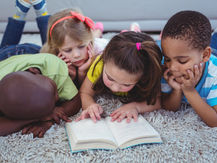Magical Writing Moments: Simple Ways to Help Your Child Write Fairy Tales at Home
Writing stories with your child at home isn’t just a fun bonding activity—it’s also a powerful way to build their creativity, vocabulary, and confidence. Storytelling allows kids to express their thoughts, solve problems, and understand the world around them. One of the most engaging ways to practice writing is through fairy tales! These magical stories open the door to imagination while also helping children learn how stories are structured. Plus, they’re just plain fun to write together!
What Makes a Fairy Tale a Fairy Tale?
Fairy tales have special ingredients that make them unique. Here are the basic elements explained simply:
-
Once upon a time... – Most fairy tales start with this classic opening to set the magical mood.
-
Characters – Usually include royalty (like princes or princesses), magical creatures (like fairies, witches, or dragons), and everyday people.
-
Setting – Often takes place in castles, forests, or faraway lands.
-
Magic – Spells, potions, talking animals, or magical objects bring excitement and wonder.
-
Good vs. Evil – There’s usually a clear hero and villain.
-
A Problem and a Solution – Something goes wrong, and the characters have to fix it.
-
A Happy Ending – Most fairy tales end on a positive note, often with the phrase “happily ever after.”
At-Home Activities to Spark Story Writing
-
Story Dice or Jar
-
Create or print story dice (or fill a jar) with different characters, settings, and magical items. Roll the dice or pick from the jar to inspire a silly or surprising fairy tale idea!
-
-
Fairy Tale Mix-Up
-
Take two classic fairy tales (like Cinderella and Jack and the Beanstalk) and mix them together! What happens when Cinderella climbs the beanstalk?
-
-
Create a Story Map
-
Draw a path with stops for beginning, middle, and end. Kids can plan their story using simple pictures or words, helping them organize their thoughts before writing.
-
-
Design a Magical Character
-
Invite your child to draw and name a brand-new fairy tale character. What powers do they have? Where do they live? Use the drawing as the starting point for a story.
-
-
Fill-in-the-Blank Fairy Tale
-
Write a simple story with blanks for your child to fill in (like Mad Libs). This lets them make choices while practicing sentence structure and creativity.
-
-
Write a Family Fairy Tale
-
Turn your family into fairy tale characters! What if your home became a castle? Who’s the brave knight, the wise wizard, or the sneaky dragon?
-
-
Act It Out First
-
If your child isn’t ready to write yet, act out a fairy tale together and then retell it in writing afterward. This helps with sequencing and vocabulary.
-
-
Build a Story with Blocks or Toys
-
Use LEGO, dolls, or action figures to build a fairy tale world. Kids can play out the story first and then write about their adventure.
-
Encouraging your child to write stories at home doesn’t need to be complicated. With a little imagination and a few simple tools, you can help them explore magical lands, dream up heroes, and discover the joy of storytelling. Whether your child is scribbling a sentence or crafting a full tale, every effort helps them grow as a confident writer—and you’ll both create some treasured memories along the way.

















